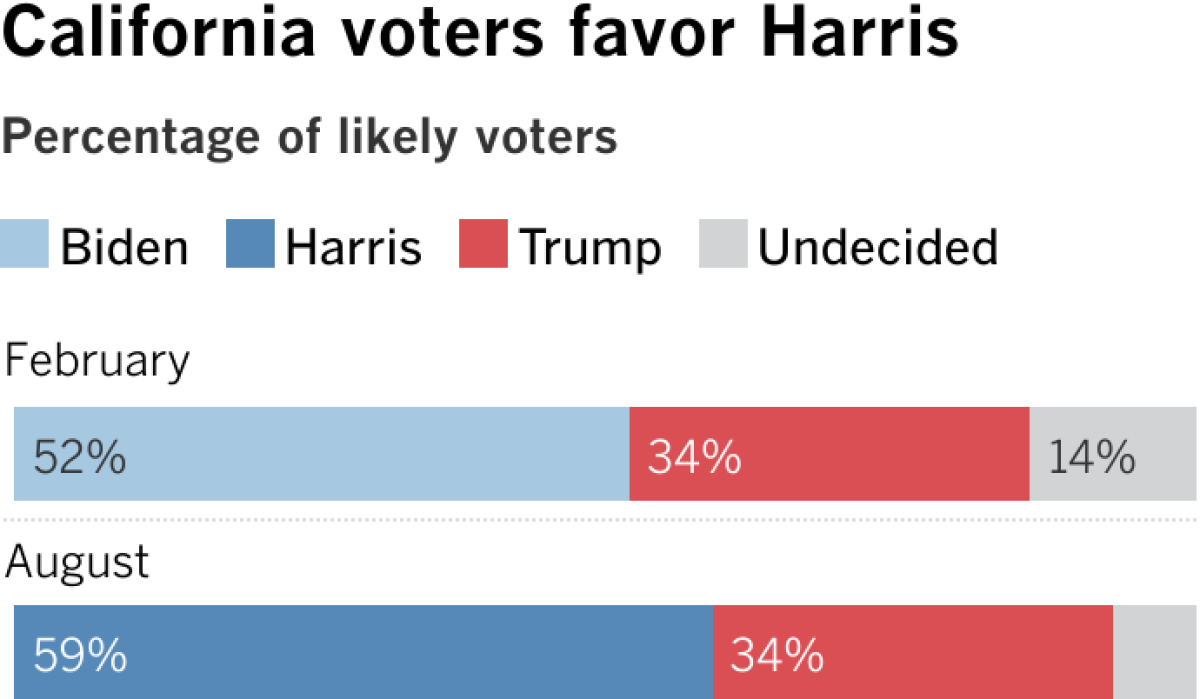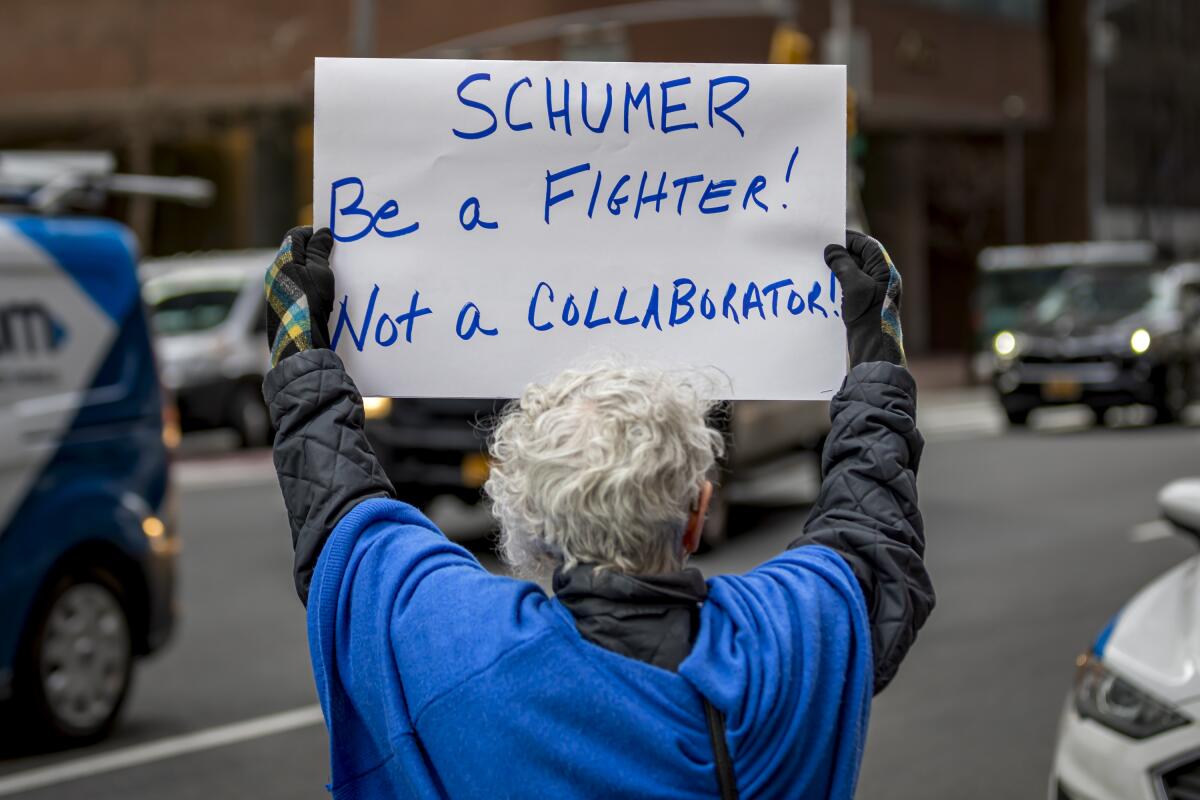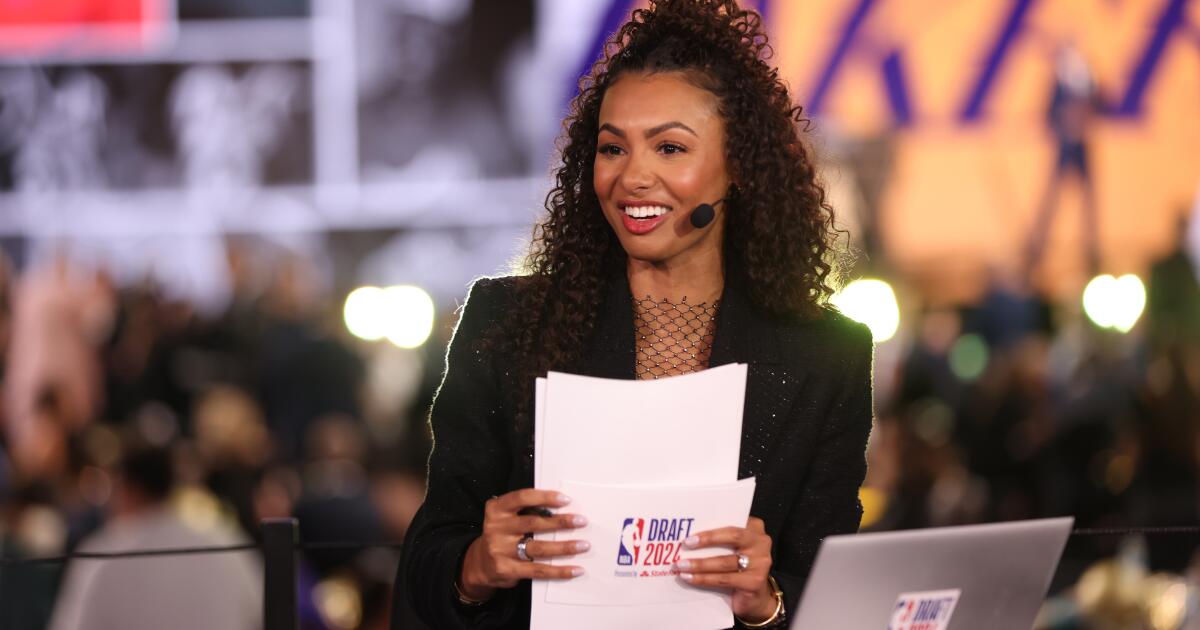Vice President Kamala Harris’ entry into the presidential race has galvanized traditional Democratic voting groups and those not aligned with a political party, helping extend the Democrats’ already large advantage over former President Trump in California, a new poll shows.
Harris leads Trump 59% to 34% in the electoral-vote-rich Golden State, a margin 7 points larger than President Biden held earlier this year, before he gave up his bid for reelection late last month, according to the survey by Berkeley’s Institute of Governmental Studies, cosponsored by The Times.
Fueling the surge by the vice president are much higher levels of support that Harris receives from younger voters, ages 18 to 29, whose backing of the Democrats grew by 23 percentage points; and Black voters, whose backing jumped by 16 percentage points.
Other California voting groups that traditionally lean Democratic also expressed higher levels of enthusiasm for Harris than for Biden — with support bumping up 11 points among liberals and 10 points among Latinos, according to the poll of likely voters, which was conducted online from July 31 through Aug. 11.
“Harris has consolidated the support of Democratic and Democratic-leaning voters in the state,” said Eric Schickler, co-director of the Institute of Governmental Studies. “With Biden, you saw a lack of enthusiasm and engagement that was especially stark among young people and people of color generally. This looks a lot more like the numbers for Democrats in 2020.”
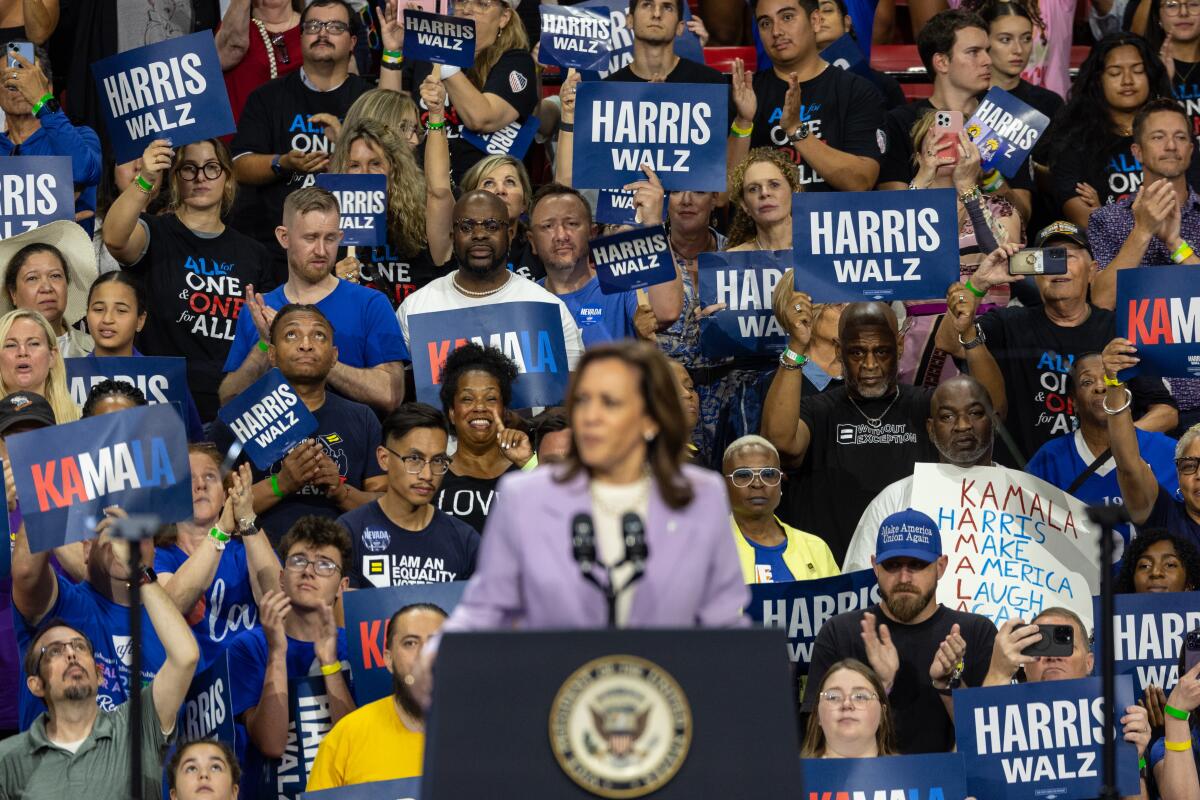
Harris, at a rally in Las Vegas on Saturday, has gained support among Latino voters in California — a good sign for her chances in crucial Nevada and Arizona.
(Jason Armond / Los Angeles Times)
California is, of course, a deeply blue state, and Biden’s victory here was never in doubt when he was positioned to be the Democratic nominee. Still, the survey reinforces what polls have shown in more closely contested states around the country, with Democrats and those who tilt toward the party expressing support for Harris, who is 59, at higher levels than they did Biden, who at 81 gave a halting debate performance on June 27 that escalated doubts about his candidacy.
The Berkeley poll delivered another piece of good news for Democrats — showing that people who don’t belong to a political party and those who describe themselves as moderates favor Harris at significantly higher levels than they did Biden. Moderates in California said they would pick the Democratic nominee by 59% to 31% over Trump. That puts Harris 12 percentage points ahead of where Biden stood in February, the poll found. And among nonpartisan voters, the poll showed a stout advantage for Harris, with 62% of California independents saying they support the vice president, a 17-point improvement over Biden’s standing in February.
That finding might surprise some analysts, since Biden once had been viewed as the stronger candidate among independents and ideological moderates.
“Those numbers are encouraging for her so far,” said Schickler, a political science professor at UC Berkeley. “We know for sure that there will be an effort by Republicans to bring that support down by trying to taint her as an extreme San Francisco liberal. And we’re already seeing that.”
Harris could break new ground on multiple counts this year, potentially becoming the first woman and first person of Indian descent elected president. She would be the second Black president, following Barack Obama.
A slight majority of those surveyed said they believed Harris’ novel profile would be an advantage in the race, while 15% thought her race and gender would be a disadvantage. Slightly more than a third of respondents said they did not know what the impact of being a woman of color would have on the vice president’s electability. (More than half of Republicans did not express an opinion on the matter.)
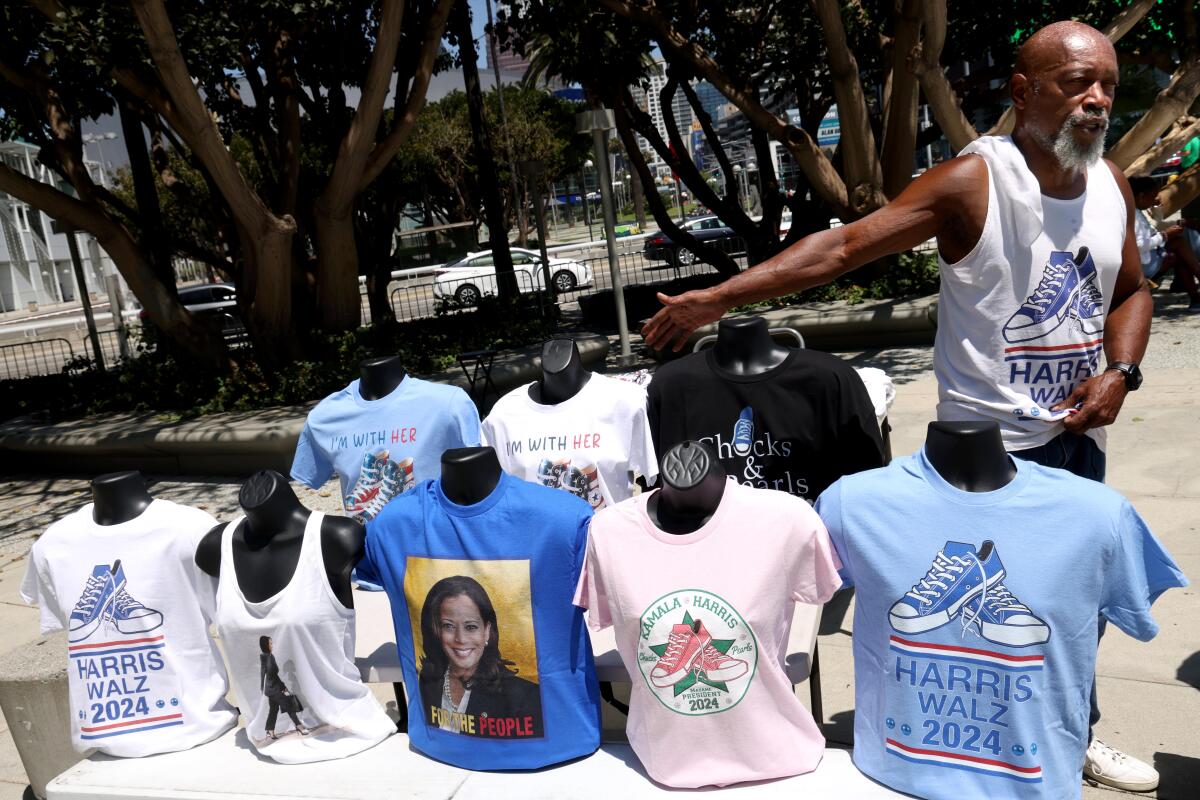
Ron Addison sells supportive T-shirts on Tuesday outside the Los Angeles Convention Center, where Harris’ running mate Tim Walz addressed a convention of AFSCME members.
(Genaro Molina / Los Angeles Times)
Black voters strongly backed Biden in 2020 but had demonstrated less enthusiasm for his reelection this year. Now, many Black voters have returned to the Democratic fold, the poll indicated: Harris leads Trump 74% to 15% among likely Black voters in California, with 11% saying they hadn’t picked a candidate. That puts Harris 16 percentage points ahead of where Biden stood in February.
Similarly, Latino voters have begun to coalesce around Harris, with 58% saying they favor the vice president, compared with 34% who said they planned to vote for Trump. That puts the new Democratic standard-bearer 10 points ahead of where Biden stood with Latinos earlier this year.
Schickler said that the increase in Latino support in California could also bode well for Harris in battleground states such as Arizona and Nevada, where Latinos make up a substantial portion of the electorate.
Harris, a former San Francisco district attorney, state attorney general and U.S. senator, has seen her popularity wax and wane.
The poll shows California Democrats have rallied around her since her emergence as the party’s nominee, with 81% supporting her and only 11% saying they would prefer another candidate. That tracks with a marked improvement in how Californians view the Democratic nominee. Just six months ago, their views of Harris were tied, with 48% expressing a positive view of her and 48% negative.
In the Berkeley institute’s new poll, 58% of the state’s likely voters had a favorable view of the candidate, who grew up in the East Bay and went to law school in San Francisco, while 40% expressed an unfavorable view.
Harris has benefited from a confluence of events, including the late withdrawal by Biden that foreclosed the possibility of a prolonged nominating contest. That meant that the vice president ascended to the presidential nomination without the typical months-long battering by party rivals.
“To some extent I think there also was a way in which Harris’ numbers were being dragged down by this general malaise among Democrats around Biden and her association with him,” Schickler said. “This launch has allowed her to benefit from pent-up enthusiasm. And she’s done a good job navigating the launch, so she’s been able to capitalize on it.”
Harris’ selection of Minnesota Gov. Tim Walz as her running mate kept the good feelings flowing among California Democrats. Among those surveyed, 56% described themselves as enthusiastic about Walz, while 25% said they were satisfied. Just 5% of the state’s Democrats expressed dissatisfaction with him.
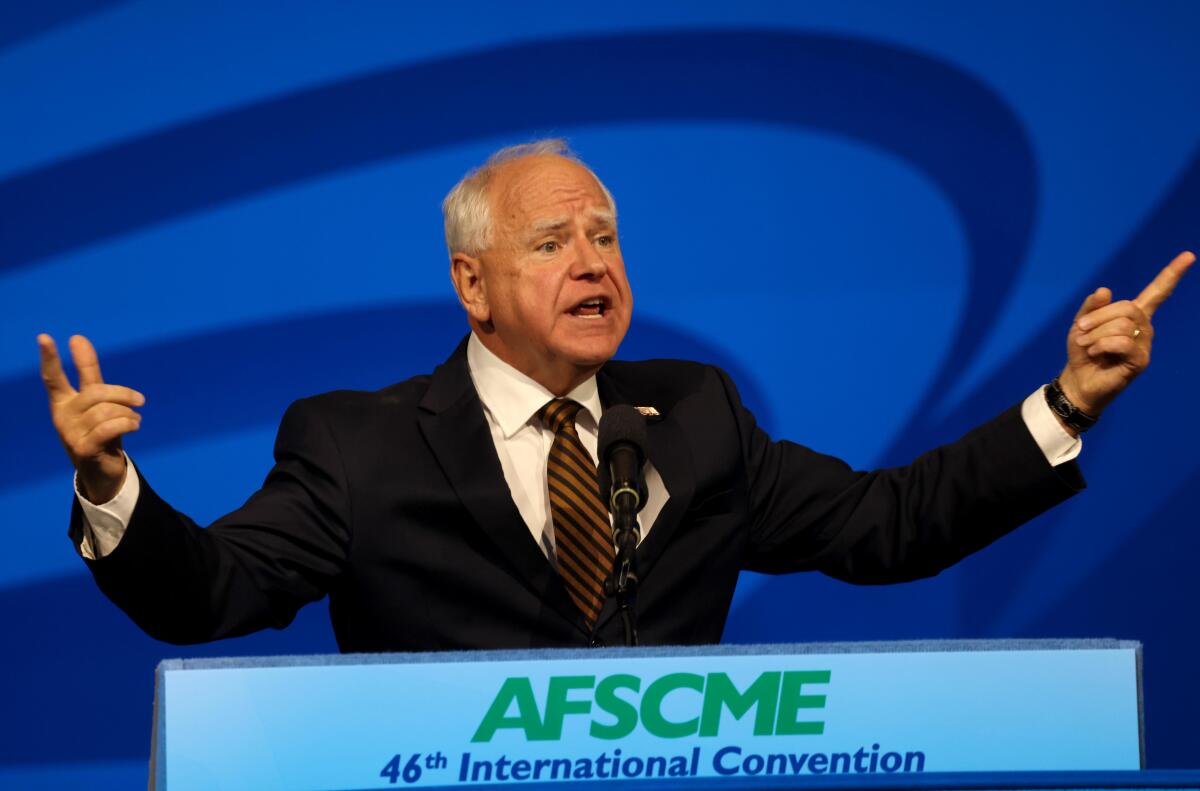
Tim Walz addresses unionized public employees from around the U.S. in Los Angeles on Tuesday before the release of poll showing recent gains for the Democratic ticket among California voters.
(Genaro Molina / Los Angeles Times)
The state’s electorate remains sharply polarized not just on the candidates but on underlying issues, including the economy.
Among those who support Harris, 37% said they are better off than a year ago, and 37% said their economic status had not changed. Just 25% described themselves as worse off. In contrast, 81% of Trump voters polled said they are worse off financially than they were a year ago.
“I think there is a fair amount of cheerleading that goes on for both sides,” with voters giving more positive reviews to the economy when a politician or party they support holds the presidency, Schickler said.
The poll delivered bad news to another Californian — Robert F. Kennedy Jr. Fifty-nine percent of likely voters surveyed in the state had an unfavorable view of the independent presidential candidate, 42% saying they held that view “strongly.” Of the 23% who had positive feelings about him, only 4% said they were strongly favorable.
The poll was administered online in English and Spanish from July 31 to Aug. 11 among 3,765 Californians considered likely to vote in the November general election. The pollsters said the margin of error, while “difficult to calculate,” was approximately 2 percentage points for the entire sample and higher for subgroups.
